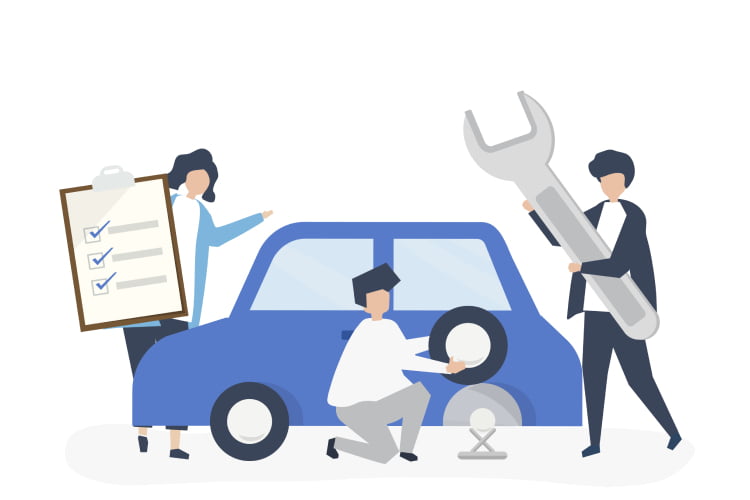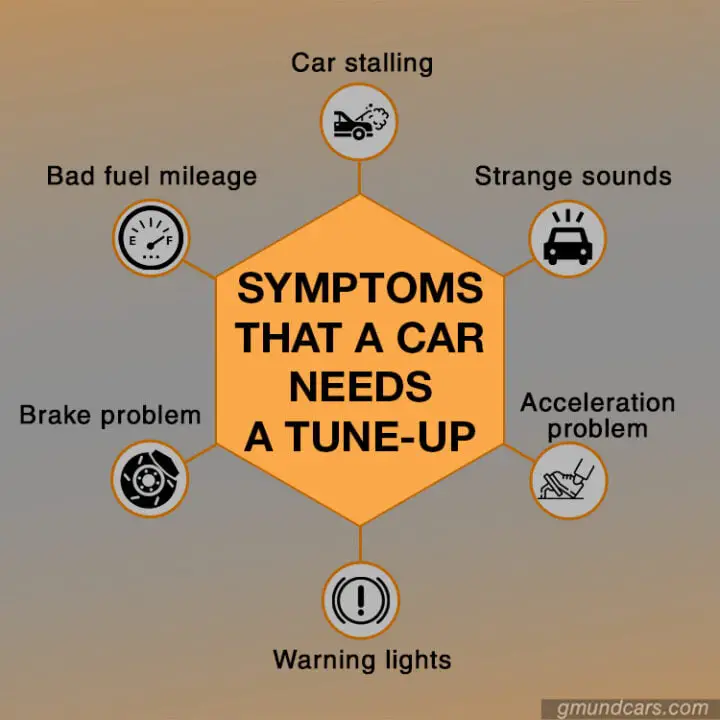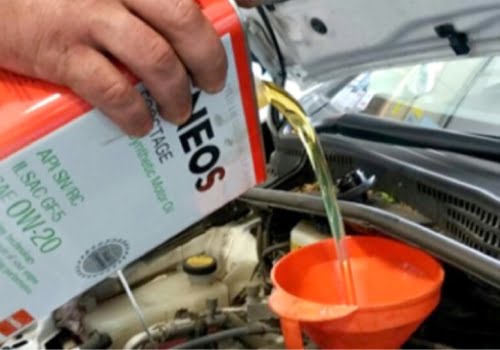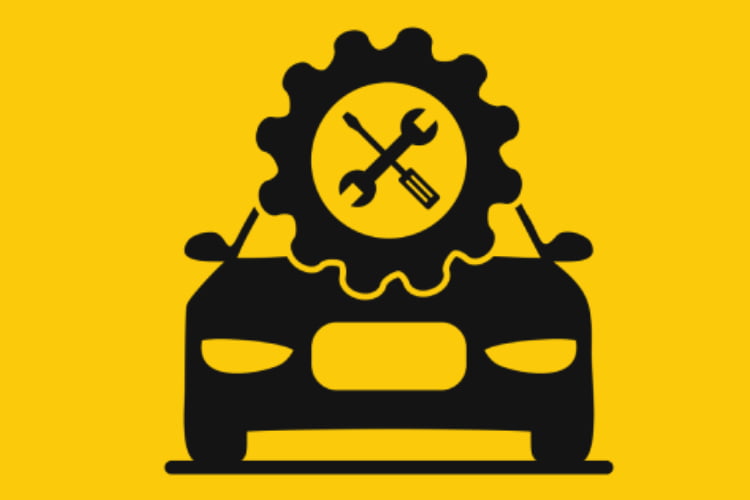Are you considering a tune-up for your automobile? If so, tuning-up your car can be done in two ways. Either you can undertake the task personally or hire a professional auto mechanic. You might be wondering, what is the going rate for car tuning? The cost typically ranges from $200-$1,500 when hiring a mechanic. If you choose to conduct the tune-up yourself, expect expenses between $150-$400 as a large portion of the cost can be attributed to the labor involved in the tune-up.

What Is a Tune-Up for A Car?
In defining what a tune-up for a car is, it would be much easier to look at the human body. The human body functions according to specific rules of hygiene and care. A regular check-up with a doctor is needed to get the best out of the body for everyday activities. A tune-up is like a check-up with the doctor for a car. Your vehicle is accessed and then optimized for better general performance.
A tune-up process can be divided into two parts:
Assessment is the first part of the process, which involves inspecting your vehicle’s fuel system to make sure your fuel filter is clean, your fuel pump is in good shape, and your fuel injector is in good working conditions. It also involves visually checking other parts of your car engine, including your spark plugs, the engine’s PCV valve, air filters, transmission fluid, power steering fluid, and other parts of the engine system.
The second part involves the real tune-up. This part is done after your car’s engine has been assessed. Depending on the assessment result, various maintenance procedures would be carried out on your car engines, which would vary from individual car results.
It should be noted that the tune-up process would vary from car to car as a brand, age, and model would determine what would be needed and the eventual price for the entire tune-up process.
Symptoms That A Car Needs A Tune-up

It could be a hassle trying to determine if your car needs to be tuned up on your own. For example, should you tune up your car a year after buying it? Or a few months? Time might not be the determining factor in tuning up your vehicle. Instead, there are telltale signs that can give you clues to let you know your car needs a tune-up. Here are some of these signs.
Your engine starts to stall
While driving a manual transmission car, your vehicle stalling is not uncommon if you are getting familiar with the vehicle. However, if you notice that your car is still stalling even after you have become an experienced driver, it is time to have your transmission tuned up. Stalling is when your car suddenly goes off while driving.
You begin to notice strange sounds
Every driver should learn one vital lesson to identify sounds coming from your vehicle. Once your car begins to give off strange sounds, it could indicate that you should tune up your car. For example, some peculiar sounds might result from a faulty engine or a bad pump.
Your vehicle does not accelerate on time
Most new vehicles boast a quick acceleration rate. Yours might not be on the level of a Tesla, but it shouldn’t take too long to reach high speeds. If you notice that your vehicle seems uncomfortable while accelerating, you should take it for a tune-up.
Bad Fuel Mileage
You’ve been driving your vehicle for a while. You must notice a drop in fuel efficiency. When you begin to see this, your car is due for a tune-up. There could be a lot of reasons why your car’s fuel mileage is off. A visit to the mechanic for a tune-up will help you get to the root of the matter.
Your brakes begin to give signs of failure
One of the worst incidents every driver aims to avoid is brake failure. Often brakes do not suddenly fail; they give signs before eventually wearing out. Once you begin to notice that your brakes are taking too long to respond, you should take your car for a tune-up.
Warning signs on your dashboard
Your dashboard is an integral part of your car, but it is often ignored. Different lights indicate different things. If a strange light comes on, you should check the car manual immediately to determine what happened. After that, if there are any problems, let’s visit your nearest auto shop for a tune-up.
Read more: Car Warning Lights: What You Should Know
What Does A Tune-up Do?
There are several benefits associated with tuning up your car.
- The first and foremost benefit is that it puts your car in a sound and roadworthy state.
- One of the things you pay attention to when tuning up your car is the fuel filter and pump. This thing, in turn, helps your vehicle conserve more fuel down the line.
- It gives you a level of peace of mind when using your car. You are not scared of a sudden breakdown after tuning up your car.
- When done correctly, engine tuning or generally tuning up your car would increase its resale value. Who wouldn’t want to sell his car at a reasonable market price?
Car Tune-up Checklist And Cost:
When it comes to your car being tuned up, there are several parts to consider. Tuning up these parts is vital for the overall health of your vehicle.
| Component | Estimated Cost (Including parts and labor cost) |
|---|---|
| Oil and oil filter | $35-$125 |
| Engine coolant | $100-$200 |
| Fuel filter | $60-$120 |
| Air filter | $10-$70 |
| PCV valve | $35-$75 |
| Spark plugs | $100-$200 |
| Wheel alignment | $70-$100 |
| Brake pads, rotors and calipers | $300-$800 |
| Transmission fluid | $130-$480 |
| Power steering fluid | $95-$125 |
| Belt tensioner | $140-$400 |
| Timing belt | $300-$500 |
| Serpentine belt | $60-$200 |
| Mass airflow replacement | $200 |
| Total cost: | $1,635-$3,595 |
This total cost of a complete tune-up is only for consulting purposes. It’s not always that you have to replace all of the components. In addition, the cost is up to your car brand, model so that it can vary for each particular case. You can consider doing it yourself for some parts to save lots of money.
Oil and oil filter

Oil is almost synonymous with blood for your engine and getting an oil change is an essential part of your engine tune-up. Typically, you can use conventional oil or synthetic oil.
Getting an oil filter could be optional after a proper assessment has been made. However, it is usually best to get a good oil filter since your aim is beyond just changing your car’s oil. An oil filter costs between $7 to $15.
Most auto mechanics would charge you between $35 and $75 when conducting your oil and filter change. These costs can rise to about $65 to $125 when using synthetic oil. Frequently additional charges come from workmanship, as the oil and filter used do not cost as much as the total bill. You can decide to carry out the oil and filter change yourself, but be prepared to get dirty.
Engine coolant
As the name indicates, your engine coolant is responsible for keeping your engine cool. While completely changing this at every tune-up might not be the best way to go, you can top up your engine coolant once in a while. It will help if you change the coolant during a tune-up when you notice it is at a low level, leading the engine to overheated. This is because, after a while, the coolant becomes acidic and could further damage your engine. The engine coolant change procedure costs between $100 to $200.
Fuel filter
The importance of the fuel filter cannot be overstated. It keeps your fuel clean, preventing dust and other impurities. Unfortunately, the fuel filter also becomes clogged with time, and its functionality deteriorates. That would affect the engine negatively in the long run. Therefore, tuning up your car should involve assessing this part and changing it when necessary. Getting a fuel filter and other necessary parts could cost between $10 to $40, while the cost for changing it, i.e., labor and filter, would range between $60 to $120.
Air filters
Like the fuel filter, the air filter is essential to the proper functioning of your car. It allows more air to run into the engine and increases fuel efficiency. The truth is that most people often overlook the air filters when they tune up their cars themselves. It should be the job of your auto mechanic to make sure your filters are changed. This change could be done for as low as $10 and as high as $70. Air filters cost between $10 to $30, depending on the type and brand. Some might even go for higher prices.
PCV valve
By removing harmful gasses from the engine, PCV valves or Positive Crankcase Ventilation valves act as filters. An engine’s PCV valve is vital to its health after internal combustion. A damaged PCV valve is harmful to your fuel economy, may result in oil leaks, and may cause your car to stall.
Thankfully, changing the PCV valve in a tune-up process is not expensive. It ranges between $35 to $75. The PCV valve itself is quite cheap as you can get it for between $10 to $15, but fixing it yourself might be a hassle.
Spark plugs

Spark plugs may seem insignificant, but they play such a crucial role in your vehicle that their absence could ground it. They are cheap and can be easily gotten. You might need to get more than one at a time, but their run-up costs are still quite negligible. You can pay between $16 to $100 for a set of spark plugs. The price at a mechanic for the tune-up ranges between $100 to $200. If you think this is too expensive, opt to do it yourself to save money.
Wheel alignment
Wheel alignment involves aligning your car’s tires to directly parallel to the ground. While there are positive and negative camber in wheel alignment, they are not suitable for daily vehicles on normal roads. In addition, they often cause uneven wear and tear, damaging your tires. This could result in further complications.
On average, wheel alignment costs between $70 and $100, depending on the type of car.
Brake
The importance of working brakes could be vital in some emergencies. Therefore, this is one essential tune-up part. To properly tune up your brake, you might need to change your brake pads, rotors, and brake calipers.
Cost varies from one car brand to another and from seller to seller. To replace brake pads only, you will need to budget between $35 and $150 for parts for all four wheels. Rotor replacement will cost you between $30 and $75. The cost of a single caliper can reach $130, and several can reach even higher prices.
It would help if you kept in mind that the payment for labor on each service remains separate.
When you begin to add labor, you will be spending between $350 to $900, and it could go far higher than this depending on your vehicle make.
Transmission fluid

Credit: commons.wikimedia.org
People often do not understand the difference between engine oil and transmission oil. They are distinguished by the fact that transmission oil also acts as a hydraulic fluid for the car’s engine, for your car to function properly.
Transmission fluids usually last over 40,000 miles before turning corrosive. So you don’t need to wait that long to change them.
According to the brand and type of transmission fluid, transmission fluid costs $8-$20 per quart, and there are about 5-15 quarts for a change ($40-$300). When changing your car’s transmission fluid, you should also change the filter and pan gasket. These cost between $15 to $30 and $75 to $150 respectively. It should cost between $130 and $480 to change this with your auto mechanic.
Fortunately, this is one of your car’s tune-ups that you can do on your own. However, if you decide to do it yourself, it should cost you between $50 to $150, especially if you are simply changing the oil.
Power steering fluid
If you have ever driven your car with a stiff steering wheel, you would understand more the importance of the power steering oil.
Power steering fluid costs between $16 to $25. Changing it with an auto mechanic would include labor costs and could be as low as $95 or as high as $125. Like most oil changes, this is one tune-up procedure you can perform by yourself. A level of technical knowledge might be needed, though.
Serpentine, belt tensioner, and timing belts
These belts are essential for the internal combustion engine. While the serpentine belt takes mechanical power from the engine and distributes it to other vehicle parts, including the water pump and alternator, the timing belt keeps the camshaft and crankshaft movements aligned as well as control the valves in your vehicle. In addition, the belt tensioner keeps the tension on the belts at the right amount for the smooth running of the belts.
Due to the difficulty of changing a timing belt costs approximately $300 to $500 to replace one. The serpentine belts cost approximately $25 to $75, and changing them in a mechanic shop costs $60 to $200. The expensive cost is partly due to how difficult it is to change the belt. An average belt tensioner replacement will cost between $140 and $400. Changing these belts and the belt tensioners generally takes an hour.
You should change the belts if they have signs of fraying.
Mass airflow replacement

The mass airflow sensor (also known as the MAF) monitors the temperature and volume of air entering the engine through the air intake. MAFs ensure effective combustion by regulating the fuel mixture in the cylinders. It is impossible to overestimate their significance. The cost would be around $200 to replace one. As for the MAF, it costs about $75 and can be easily fixed if you’re handy.
Read more: Best timing belts and timing belt kits 2021 [Buying guide and review]
FAQs:

How long does a tune-up take?
Placing time on the entire tune-up process might be a bit difficult. Sometimes not every process needs to be done, and your vehicle’s brand is also a huge determinant.
On average, it takes between 2 to 4 hours to tune up your car. Of course, older cars would require more time than newer cars.
How often should we tune-up for a car?
A car is constantly in use; as a result, it should be tuned up periodically. How often you should tune up your vehicle, though, would depend on the type of vehicle. Newer cars now use electronic injections and fuel injection systems, making them more efficient. For these models, it is advised that you tune up your vehicle after it has gone beyond 25,000 miles but not so far above 100,000 miles. Older models that use non-electric ignitions should be tuned every 10,000 to 12,000 miles or every year.
Does a tune-up make your car run better?
A tune-up makes your car run better. It helps to maximize more fuel, preserve engine integrity and prolong your car lifespan.
Read more: Vehicle Maintenance: What Should You Do For Fall Cars?
Conclusion
Your car might not be your body, but it does serve you well. Taking your car for regular tune-ups would put it in a better position to serve you better.